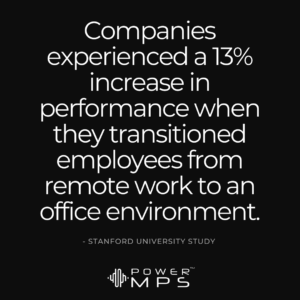Remote vs. In-Office: Should Employees Return to the Office?
In the wake of the global pandemic, remote work became necessary for many companies, revolutionizing how we work. However, as the world recovers, a debate has emerged about whether employees should return to the office or continue working remotely. On the one hand, employees have been enjoying the freedom of working out of the office. On the other, managers miss the supervision and collaboration of in-person work.
Here are some of the biggest arguments for having employees return to the office, and the biggest reasons against having the workforce return to the office and instead favor a remote or hybrid work environment:
For: Boosting Collaboration & Innovation
Disney CEO Bob Iger recently sent out a mandate for all workers to return to the office. His reason: “In a creative business like ours, nothing can replace the ability to connect, observe, and create with peers that come from being physically together, nor the opportunity to grow professionally by learning from leaders and mentors.” Disney joined the likes of Tesla, Amazon, and JP Morgan as companies demanding an in-office workspace.
Research has shown that face-to-face interactions foster creativity and knowledge exchange. Employees working side by side can engage in spontaneous conversations, brainstorming sessions, and impromptu problem-solving discussions, leading to fresh ideas and innovative solutions.
Research from MIT revealed that face-to-face communication is 34 times more effective than email exchanges in driving collective intelligence within teams. Moreover, in an office setting, employees can leverage shared spaces such as meeting rooms, whiteboards, and brainstorming areas, facilitating group discussions and fostering camaraderie. These physical spaces serve as catalysts for collaboration, enabling teams to bounce ideas off each other and build on collective knowledge more effectively than virtual platforms allow.
Against: Unleashes Productivity & Flexibility
Eliminating commuting time allows employees to dedicate more time to work-related tasks, resulting in higher productivity. Remote work eliminates commuting costs, including transportation expenses, and parking fees. It also reduces expenses related to professional attire and dining out during lunch breaks. These savings contribute to employees’ financial well-being and serve as an additional perk of remote work.
Remote work also enables flexibility in managing personal and professional responsibilities. Employees can tailor their work schedules to suit their peak productivity hours and accommodate personal commitments.
For: Nurturing Company Culture & Social Connections
In the view of some, office environments provide a sense of community and belonging that is challenging to replicate remotely. Regular face-to-face interactions foster stronger relationships, trust, and a deeper understanding of colleagues’ strengths and working styles. These connections play a vital role in building cohesive teams and driving employee engagement. It’s also proven that employees with a best friend are seven times more likely to be engaged in their jobs.
Furthermore, the office acts as a hub for shared experiences, fostering a sense of identity and purpose within the organization. Celebrating successes, recognizing achievements, and engaging in team-building activities are more impactful when conducted in person. This strengthens the bond between employees, aligns them with company values, and bolsters employee loyalty.
Against: Enhances Work-Life Balance
Working from home allows individuals to spend more time with their families, engage in hobbies, and take care of personal responsibilities. This balance reduces stress and burnout, resulting in happier and healthier employees.
A study published in the Harvard Business Review revealed that remote workers report lower stress levels and higher job satisfaction compared to their office-based counterparts. Remote work fosters autonomy and empowers employees to structure their work environments according to their preferences, leading to increased job satisfaction and reduced turnover rates.
According to a survey by FlexJobs, 65% of respondents reported that they are more productive working from home, citing fewer interruptions from colleagues and fewer office politics.
By eliminating the need for long commutes and allowing for flexible scheduling, remote work offers more time for personal pursuits, family obligations, and self-care.
For: Overcoming Productivity Challenges
Working remotely is not an all-size fits all approach; some love it, while others consider it their worst nightmare. Distractions at home, isolation, and difficulty separating work from personal life can all hinder productivity. A survey by Buffer reported that 20% of remote workers struggle with loneliness, leading to decreased motivation and engagement.

Returning to the office can provide a structured environment that promotes focus and concentration. Separating work and personal space allows employees to establish clear boundaries, improving work-life balance. Additionally, in-person supervision and access to real-time support from managers and colleagues can help overcome obstacles more efficiently.
Studies have consistently shown that a physical office presence positively impacts productivity. According to research conducted by Stanford University, companies experienced a 13% increase in performance when they transitioned employees from remote work to an office environment. The study also revealed that remote employees are more likely to experience difficulties staying motivated and achieving work-related goals.
Against: Unlocking Global Talent
When location is no longer a barrier, companies can recruit top talent regardless of their geographical location, leading to a more diverse and inclusive workforce.
Remote work allows companies to tap into specialized skills and expertise that may not be available locally, leading to increased innovation and problem-solving capabilities. According to a survey by Owl Labs, 58% of companies believe that remote work options can enhance diversity and inclusion within their organizations.
Additionally, remote work promotes a more level playing field, particularly for underrepresented groups. By eliminating the need to relocate or face discriminatory practices in certain regions, remote work provides equal opportunities for career advancement and fair compensation.
Which do you think is the future? Remote or in-office work environments? Let us know with a comment below.


Comments (0)